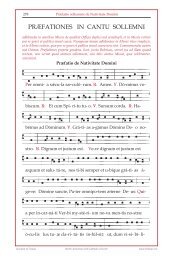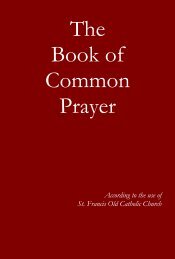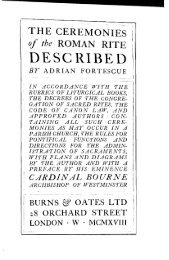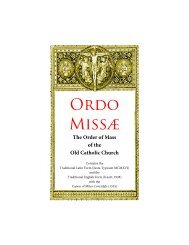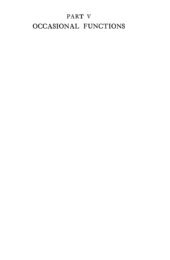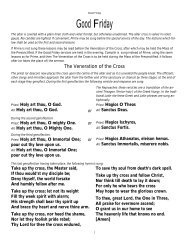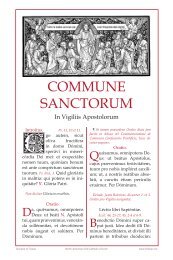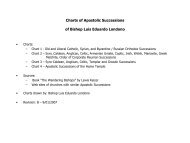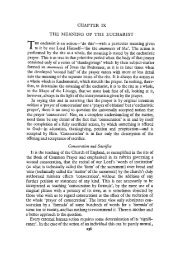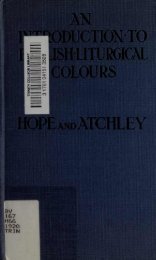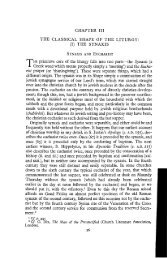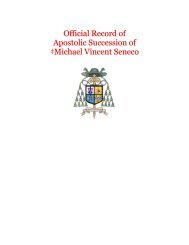Eucharist and Lord's Supper
Eucharist and Lord's Supper
Eucharist and Lord's Supper
You also want an ePaper? Increase the reach of your titles
YUMPU automatically turns print PDFs into web optimized ePapers that Google loves.
58 THE SHAPE OF THE LITURGY<br />
quite certainly repeat from time to time without any comm<strong>and</strong> from Him<br />
---:less often tha~ the breaking of bread at the beginning of the meal, but<br />
~tl1l frequently III any case. (Wine was cheap <strong>and</strong> easy to get; there is no<br />
Illsta~~e of a c~abilrah meal without at least this one cup of it, <strong>and</strong> no<br />
rabblllic ~eg~latlon as to what is to be done in its absence.)!<br />
Bu~ thIS tIm.e part, at least, of His new meaning must have been quite<br />
shockmgly plam to the apostles at the first hearing of the words. He has<br />
just been thanking God in their name in the Thanksgiving over the cup<br />
'for Thy Covenant which Thou hast sealed in our flesh', <strong>and</strong> all the tremendous<br />
things that meant for the jew-the very essence of all his religion.<br />
And now, whenever this particular chabilrah meets again for all time to<br />
come-'This cup is the New Covenant' sealed 'in My Blood. Whenever<br />
you drink (the cup of blessing in My chabilrah) do so for the re-calling of<br />
Me'. 'And when' like every chaburah at the close of its meeting 'they had<br />
sung a psalm, they went out' (Mark xiv. 26)2.<br />
What our Lord did at the last supper, then, was not to establish any new<br />
rite. He attached to the two corporate acts which were sure to be done when<br />
His disciples met in the future-the only two things which He could be sure<br />
they would do together regularly in any case-a quite new meaning, which<br />
had a special connection with His own impending death (exactly what, we<br />
need not now enquire).<br />
The double institution in bread <strong>and</strong> wine has a vital bearing on the whole<br />
1 It is puzzling to account for Lietzmann's statement that the early Jerusalem<br />
church 'very seldom' used wine at its chabiirah meals in later years (op. cit. p. 250)<br />
because our Lord in His w<strong>and</strong>erings through the l<strong>and</strong> had habitually taught them<br />
to use water. To say the least of it, this consorts singularly badly with the accusation,<br />
'Behold a gluttonous man <strong>and</strong> a wine-bibber!' (Luke vii. 34). Lietzmann is, of course,<br />
making out a case, essential to his theory of eucharistic origins, that S. Paul is<br />
chiefly responsible for the regular addition of the cup to the original Jerusalem rite<br />
of the 'breaking of bread' only. But that it seems unnecessary to take such special<br />
pleading seriously, I would undertake to produce at least ten pieces of evidence that<br />
wine was commonly procurable even by the poorest in first century Palestine, <strong>and</strong><br />
that abstinence from it was regarded as the mark of professional ascetics like the<br />
Essenes <strong>and</strong> the Baptist, from whom our Lord always dissociated Himself.<br />
• I leave this interpretation of the last supper as it stood (but for one readjustment<br />
where I was plainly wrong) in my draft before I came on the very similar explanation<br />
given by Dr. Cirlot, The Early <strong>Eucharist</strong>, p. 155 sq. I am much reassured to<br />
tind that his fuller discussion reaches substantially the same conclusions from a<br />
somewhat different basis. We seem to have read much the same ancient <strong>and</strong> modern<br />
literature, but so far as I remember my own starting points were two: the remark of<br />
S<strong>and</strong>ay, Hastings' Dictionary of the Bible, ii. 637a: 'The institution of the <strong>Eucharist</strong><br />
appears to have connexions both backwards <strong>and</strong> forwards-backwards with other<br />
meals which our Lord ate together with His disciples, forwards with those common<br />
meals which very early came into existence in the Apostolic Church'; <strong>and</strong> side by<br />
side with that, this from Dr. Oesterley (Jewish Background, etc., p. 172): 'The circle<br />
of friends formed by Christ <strong>and</strong> the Apostles constituted a chabUrah. According to<br />
John xv. 14 our Lord refers to this in the words, Ye are my friends (chaberim) ifye<br />
do the things which I comm<strong>and</strong> you'. Given those two broad hints <strong>and</strong> a certain<br />
knowledge of chaburah customs, the explanation above seems to arise straight out<br />
of the N.T. facts; though it has escaped the notice of all New Testament scholars<br />
among us until Dr. Cirlot. Myown debt to him in the rest of this chapter is considerable,<br />
but difficult to assess exactly.



